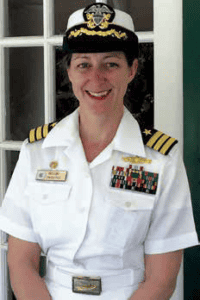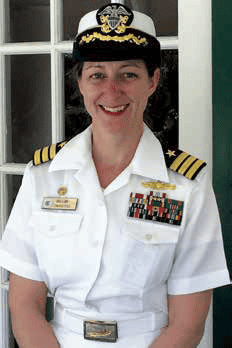
During my more than 20 years in the Navy, two distinct times highlighted the Jewish community in the military coming together.
While at the U.S. Naval Academy in Annapolis, Md., there was a large and active Jewish Midshipmen Club. All “plebes” (first year students) are assigned a sponsor family in the community who welcome Midshipmen into their homes on weekends. The Naval Academy pairs plebes as much as possible with families of the same faith, which made for a vibrant mix of the local community and Midshipmen at Friday night services. At the time, services were held in a small multi-faith chapel in Mitscher Hall, led by the Jewish Chaplain and followed by an Oneg Shabbat—during which many bagels were ravenously consumed by the hungry Midshipmen and the leftovers scavenged-off to Bancroft Hall (the dormitory) to share with friends. (Coincidentally, the last Jewish Chaplain during my time in Annapolis was Rabbi Jonathan Panitz, the brother of Rabbi Michael Panitz of Temple Israel in Norfolk.)
Visitors of the Naval Academy today will see the beautiful Commodore Levy Chapel, built in 2005 and named in honor of Commodore Uriah P. Levy (1792–1862), the first Jewish commodore in the United States Navy, who is famous for refusing to flog his sailors. The Levy Center is a vibrant gathering place for Midshipmen and members of the local community where weekly services are held and Jewish life events are celebrated. Housed in the Levy Center is the Esther and William Miller Chapel, named after the parents of Jerry Miller of Virginia Beach. The Miller Chapel was dedicated and opened for use on September 18, 2005.
Over the subsequent years, I served on board several smaller ships with a crew of only 200–300, which did not have a chaplain permanently assigned. On the larger aircraft carriers where I served, several chaplains supported the crew and air wing of approximately 5,000 sailors. When I served in USS Enterprise (CVN 65) we deployed to the Western Pacific, Middle East, and Mediterranean twice in a two year period. Although we did not have a Jewish chaplain on board, I let the senior chaplain know that if any sailors were interested in holding Jewish services that I would volunteer as the lay leader. Although we did not hold services regularly due to the ship’s operational schedule, we did come together and hold a Passover Seder during one of the deployments. I worked with the ship’s Mess Specialists to make a Seder menu and find as many items as possible to create our Seder plate, some of which were generously provided by the Aleph Institute which sends care packages around the world to deployed Jewish service members. I remember a very special evening where the handful of Jewish sailors came together at sea, while jets took off and landed right over our heads, and read the Haggadah and celebrated together.
Elaine Luria retired from the U.S. Navy in April as a Commander. She is the owner of The Mermaid Factory and a member of Ohef Sholom Temple.
– Elaine Luria

